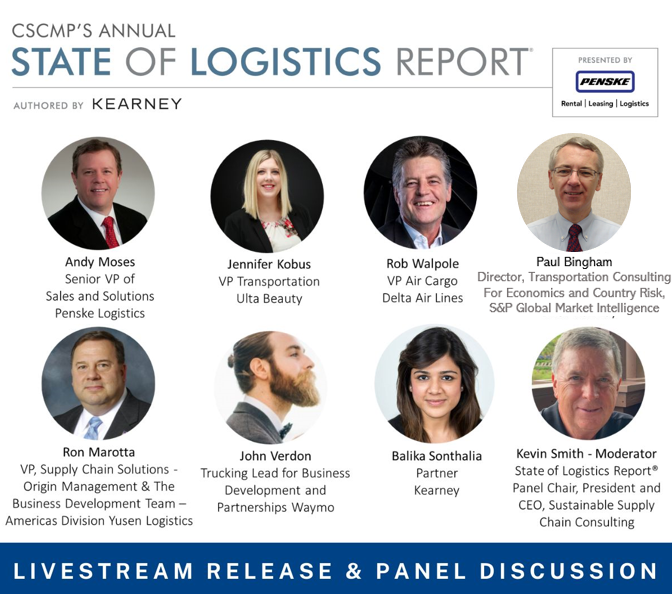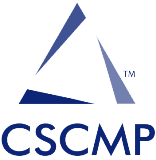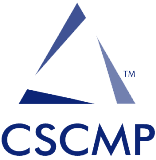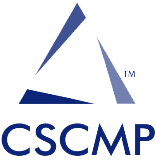
Catalog Advanced Search
-
Contains 1 Component(s)
Challenges in the truckload and LTL sectors remain top of mind for supply chain professionals entering the new year. Around every corner lies another obstacle to achieving annual supply chain goals. Register today to hear forecasting predictions from industry experts in the truckload and LTL space.
During this CSCMP Transportation Center of Excellence webinar, sponsored by Truckstop, a panel of executives representing manufacturing, 3PL, carriers, and more will share how they plan to prepare for the new year as it pertains to truckload and LTL modes.
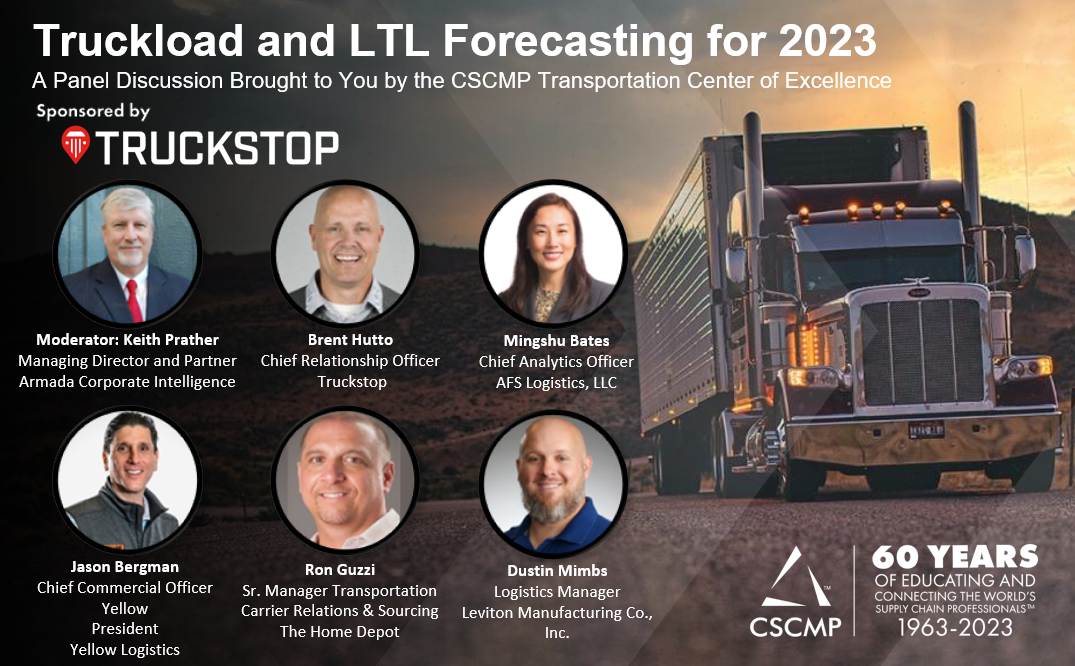
-
You must log in to register
- Member - Free!
- More Information
-
You must log in to register
-
Contains 1 Component(s)
CSCMP’s Annual State of Logistics Report®, presented by Penske Logistics, was released on Tuesday, June 21st, 2022, featuring a presentation of the report highlights by Kearney and followed by a discussion with this year’s panelists. The 2022 report, researched and authored by Kearney and presented by Penske Logistics, offers a snapshot of the American economy through the lens of the logistics sector in the overall supply chain. For over three decades, this rigorous compilation of leading logistics intelligence from around the word shines a spotlight on industry trends and offers key insights on the ever-evolving industry supply chains. CSCMP Members get complimentary access to this report as a benefit of their membership.
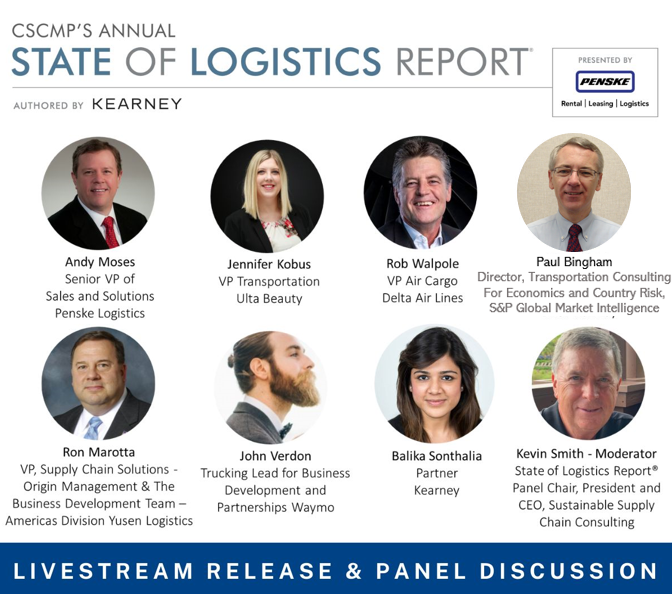
Every year CSCMP collaborates with global strategic management consulting firm, Kearney, as the author and researcher, and with Penske Logistics continuing in its longstanding role as presenter of the report.
This session is for CSCMP members only. Any rebroadcast, retransmission, or reporting of this webinar presentation, without the express written consent of CSCMP is prohibited.
-
You must log in to register
- Member - Free!
- More Information
-
You must log in to register
-
Contains 1 Component(s)
This case study illustrates the use of the total cost of ownership concept to analyze and compare two supply chains – one international and one domestic.
This case study illustrates the use of the total cost of ownership concept to analyze and compare two supply chains – one international and one domestic. The case provides an opportunity to calculate economic order quantity and safety stock quantities and then combine purchase price, shipping costs, and inventory carrying costs to quantify the differences between the two supply chains.
**Teaching notes and associated data files are available only to current academic CSCMP members. Please contact education@cscmp.org to request the additional files.
-
You must log in to register
- Non-member - $20
- Member - Free!
- More Information
-
You must log in to register
-
Contains 1 Component(s)
This case study is designed to explore the challenges of forecasting and inventory management in spare parts industry.
This case study is designed to explore the challenges of forecasting and inventory management in spare parts industry. Most items in this industry have lumpy, intermittent, erratic and slow demand patterns. Traditional forecasting techniques cannot be applied to this group. Also most textbook methods on inventory planning, assumes the demand is normally distributed – which is also not the case in spare parts industry. Strategies can be tested for the demand data provided for about 40 items.
**Teaching notes and associated data files are available only to current academic CSCMP members. Please contact education@cscmp.org to request the additional files.
-
You must log in to register
- Non-member - $20
- Member - Free!
- More Information
-
You must log in to register
-
Contains 1 Component(s)
This academic case study focuses on the upstream procurement activities in the Gulf of Mexico.
This academic case study focuses on the upstream procurement activities in the Gulf of Mexico. BP has interest in both upstream and downstream segments in over 100 countries worldwide. The United States subsidiary of BP is the nation’s largest producer of oil and gas.
**Teaching notes and associated data files are available only to current academic CSCMP members. Please contact education@cscmp.org to request the additional files.
-
You must log in to register
- Non-member - $20
- Member - Free!
- More Information
-
You must log in to register
-
Contains 1 Component(s)
As 2020 is coming to an end, the transportation industry is finding itself facing a more volatile marketplace than we experienced in 2018.
This podcast reviews what has transpired throughout the year since the onset of the pandemic and what transportation professionals are facing as they look forward to the new year.
Featuring CSCMP President and CEO, Rick Blasgen and NASSTRAC's Executive Director, Gail Rutkowski
-
You must log in to register
- Member - Free!
- More Information
-
You must log in to register
-
Contains 1 Component(s)
Supply chains are growing more complex and challenging. Where this revolution will lead us over the next decade is worthy of analysis. The Logistics 2030 study investigates the likely drivers of future supply chain success.
Supply chains are growing more complex and challenging. Where this revolution will lead us over the next decade is worthy of analysis. The Logistics 2030 study investigates the likely drivers of future supply chain success.
The resurgence of warehousing and distribution can be attributed largely to the growth of online commerce. Over the course of 2019 and early 2020, information was collected on the current practices of warehousing and distribution. The following analysis provides a comparative view of today's capabilities versus next decade's requirements.
-
You must log in to register
- Member - Free!
- More Information
-
You must log in to register
-
Contains 1 Component(s)
Sustainability is impacting the way companies operate in every industry across the globe. Yet our understanding of supply chain sustainability and its impact on enterprises is limited. The State of Supply Chain Sustainability 2020 Report aims to fill this information gap and to help inform what the future of supply chain sustainability might look like.
Sustainability is impacting the way companies operate in every industry across the globe. Yet our understanding of supply chain sustainability and its impact on enterprises is limited. The State of Supply Chain Sustainability 2020 Report aims to fill this information gap and to help inform what the future of supply chain sustainability might look like.
Authored by:
MIT Center for Transportation & Logistics and the Council of Supply Chain Management Professionals
-
You must log in to register
- Non-member - Free!
- Member - Free!
- More Information
-
You must log in to register
-
Contains 1 Component(s)
Although it shares many logistical challenges with other industries, what sets retail apart is its need to meet ever-more-demanding customer expectations across multiple channels. As consumer buying patterns have shifted, consumer demands for service and convenience have increased.
Although it shares many logistical challenges with other industries, what sets retail apart is its need to meet ever-more-demanding customer expectations across multiple channels.
As consumer buying patterns have shifted, consumer demands for service and convenience have increased.
In this report authored by Kearney, learn how to manage the growing costs of insatiable consumers while developing a successful omnichannel supply chain with forward and reverse flows.
-
You must log in to register
- Member - Free!
- More Information
-
You must log in to register
-
Contains 1 Component(s)
As US consumers purchase 14 to 17 million new vehicles each year, they seek the right vehicle configuration at the right cost, within a "reasonable" time frame that could range from a few days to months. The roles of logistics and the automotive supply chain in achieving those goals remain largely invisible.
As US consumers purchase 14 to 17 million new vehicles each year, they seek the right vehicle configuration at the right cost, within a "reasonable" time frame that could range from a few days to months.
The roles of logistics and the automotive supply chain in achieving those goals remain largely invisible.
In this report authored by Kearney, take a deeper look at automotive logistics and the automakers' strategic imperatives needed to build a more resilient automotive supply chain.
-
You must log in to register
- Member - Free!
- More Information
-
You must log in to register
